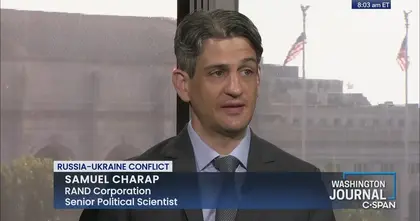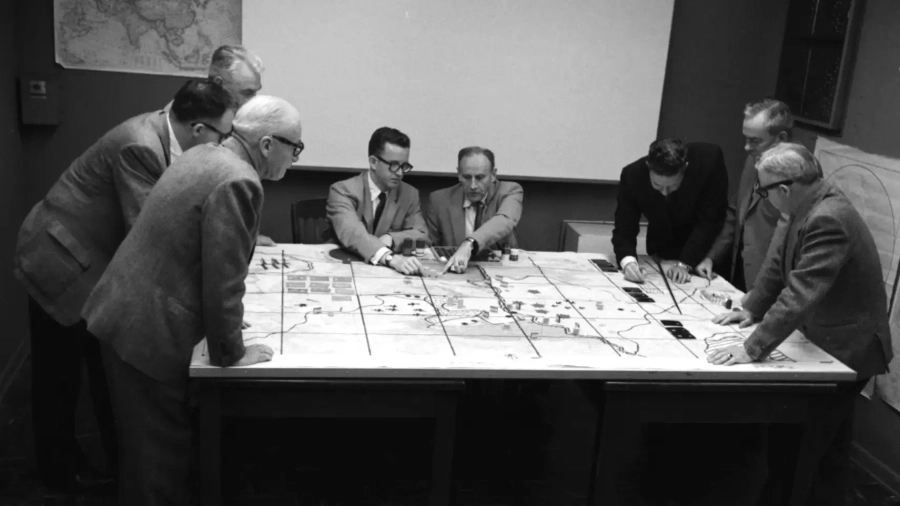Samuel Charap at the Rand Corporation is at it again. This leading thinktanker, who seems to have the ear of highly placed policymakers in the Biden administration, has recently co-authored, along with Jeremy Shapiro of the European Council, a screed clinically titled: “Elements of an Eventual Russia-Ukraine Armistice and the Prospect for Regional Stability in Europe.”
It opens with caveats to keep ardent Ukraine supporters at arm’s length: “this paper suggests possible arrangements to end the fighting and restore regional stability that could represent the ‘least-bad’ outcome under far-from-ideal circumstances.”
JOIN US ON TELEGRAM
Follow our coverage of the war on the @Kyivpost_official.
It then presents a dire cul-de-sac scenario to entice readers to consider an endgame strategy – any endgame that might extinguish this potential “forever war.”
The authors’ intellectual exercise hinges conceptually on a single word: “plausible.” They conclude the introductory litany of caveats with: “The purpose of this exercise is not to predict or even advocate for these specific outcomes. It is rather to describe the plausible elements of an armistice and an improved regional order linked to it. The path toward such an outcome remains extremely uncertain, but it is nonetheless important to have a sense of the least-worst, yet still plausible destination.”
The problem with the route to this destination is that while Charap and Shapiro’s armistice scenarios may appear plausible on the surface – tortuously plausible – they all spring from the same source: the magical thinking of Thinktankdom (often called pragmatism).

‘Europe Must Stand Up’ – EU Lawmakers Clash Over Trump’s Return, Musk’s Political Meddling
They treat Vladimir Putin and Russian imperial ambitions as a generic variable in some political science algorithm – an algorithm that by its very nature cannot process the notion of national destiny driving both Russia and Ukraine, for better or worse.
They can’t really seem to fathom the notion of national destiny as pertains to the United States either – which is why all their analyses are doomed to perpetuate a clinical instruction manual for America’s managed decline in the guise of a policy paper.
And it’s worth recalling how consistently wrong Charap has been on Ukraine.
In 2009 he advocated in support of the Obama administration’s attempt to “reset” relations with Russia. And a month before the full-scale invasion in 2022, he co-wrote a piece in Foreign Policy titled: “The West’s Weapons Won’t Make Any Difference to Ukraine.”
Analysis paralysis – or how to war-game America’s decline
Ever since the US became a global superpower in the aftermath of World War II, American advisors and policymakers have been trying to imitate the feat of those Americans considered the architects of the new world order.
This group of officials in the Franklin D. Roosevelt and Harry Truman administrations included, among others: Gen. George Marshall, after whom the Marshall Plan was named; Dean Acheson, Truman’s secretary of state; and Averell Harriman, the ambassador to the Soviet Union, who later went on to advise Presidents Truman, John F. Kennedy and Lyndon Johnson.
RAND Corporation headquarters in Santa Monica, California in 2015. Wikipedia
They are often called “the Wise Men.” Their wisdom sprang from the ability to take a situation – largely created by the audacity and courage of military and political leaders who, despite a longstanding US tendency toward isolationism, committed to defending allied democracies with all of America’s abundant resources – and crystallize that situation into a hegemonic scaffolding for global development in opposition to communist revolutions being fomented by the Soviet Union and China.
Today’s advisors are merely hyper-qualified bureaucrats tasked to manage America’s geopolitical advantage. But in reality, they are managing its decline.
It didn’t always go smoothly for the US – Vietnam was a disaster – but eventually the communist systems in the world either collapsed, as in the Soviet Union, or morphed into a hybrid one-party capitalist authoritarianism, as in China.
Subsequent advisors to presidents have tried to rekindle the “wisdom” of the post-World War II wise men. Henry Kissinger, comes to mind, as does James Baker, Ronald Reagan and George H.W. Bush’s chief advisor and envoy. One might even include men like Richard Holbrooke, who was chosen by Bill Clinton to strongarm Serbia’s Slobodan Milošević into the Dayton Accords.
Today’s would-be wise men – and here I include Charap and Charles Kupchan along with National Security Advisor Jake Sullivan and CIA Director William Burns – all like to pose as consummate pragmatists, in the spirit of the men who established American hegemony.
What separates them, however, is their capacity for bold thinking and action – the kind that allowed the US in World War II to commit themselves (albeit belatedly) to helping their allies against the imperial ambitions of the Axis Powers.
Today’s would-be wise men are merely hyper-qualified bureaucrats tasked to manage America’s geopolitical advantage. But in reality, they are managing its decline.
RAND analysts at work in the past. Photo RAND
National destiny
What today’s US advisors lack is a sense of national destiny. In fact, to speak of “national destiny” is not something you can do in the West today, at least not in the polite company of “serious intellectuals,” without inviting a few smirks and eyerolls. You can talk about it in social media, you can insert it into a campaign speech, or drop the concept in a televised debate; but to float the notion of national destiny among the intellectual elite crafting a US policy meant to get their bosses through the next election cycle… well, that’s beyond the pale.
And to be clear, by national destiny, Americans mean spreading ideas and political structures worldwide that encourage individual freedom – including freedom of speech and faith – private property and enterprise, and a general aversion to tyranny and dictators propped up by a cult of personality. In America’s case, a nation whose military is overwhelmingly superior to any other, destiny entails policing the globe to a greater or lesser extent.
It’s hard to find anyone in America’s ivory-tower institutions who can speak earnestly of such a destiny without getting laughed out of the corridors or lambasted as a neocon.
In Russia, by contrast, the idea of national destiny is a given. Putin regularly rehashes the nationalist ideas of Russian destiny propagated by philosopher Ivan Ilyn, such as the conviction that any attempt by Ukraine at separating from Moscow could only be the result of a poison injected by foreigners outside the Russian nation – which of course includes all of “Little Russia,” as Ilyn calls Ukraine.
For Putin and his ilk, 1991 was not a defeat; it was a tactical retreat.
Putin’s domestic support comes from a popular acceptance of this notion of destiny. Even those who can argue a relativistic position in contrast to Russian exceptionalism are still moved by the sheer “greatness” bestowed upon the Russian Empire. This is not something a few liberal opposition gadflies can dent.
Any suggestion that the US might negotiate with Russia as an equal when it comes to Ukraine is misguided – because it ignores Russia’s sense of destiny, the same sense of destiny that allows its leader to feed waves of men into a seemingly senseless meat grinder. For Moscow, when it comes to Ukraine, no agreement is too sacred to be trashed if that might fulfill what it sees as Russia’s destiny. No amount of human life is too dear.
And this is where Charap’s argument collapses: He assumes that Moscow would accept the reality of re-establishing relations with the West as a sort of junior partner – in a throwback to the 1990s. This runs counter to any notion of Russian national destiny.
For Putin and his ilk, 1991 was not a defeat; it was a tactical retreat. The farther aim, beyond Ukraine, is to reestablish Moscow’s sphere of influence in the world. If they are still militarily incapable of doing so, then hybrid methods must suffice until such time. We Russians are patient, they tell themselves.
Ukraine’s destiny
Today, Ukrainians most definitely have a sense of national destiny. For many it is quite simply to survive and establish a viable nation that is not contingent on Moscow’s ambitions and whims. For others, there is a vision of a thriving European nation forged by courage and tenacity to shake off tyranny, a nation that could even teach Europeans and Americans a thing or two about their own national destinies – if only they had the humility to listen to a battered neighbor.
It seems Charap is constitutionally incapable of understanding how a people behaves when driven by a sense of national destiny.
Or, perhaps, Charap does understand. He has certainly spent enough time studying Russian culture, history and politics – even regularly attending Putin’s annual Valdai International Discussion Club organized for his sycophants.
“It’s my job to understand these people, and I was given firsthand access to them,” Charap said, defending his attendance at Valdai to the New Yorker magazine. “How can you understand a country if you don’t go and talk to the people involved in the decision-making?”
But if Charap really does understand Russia, then his suggestions have been consistently and consciously aimed at indulging Moscow, a veritable hymn to Russia’s sense of national destiny – which is probably the swansong of America’s, and certainly the death knell of Ukraine’s.
The views expressed in this opinion piece are the author’s and not necessarily of Kyiv Post.
You can also highlight the text and press Ctrl + Enter












